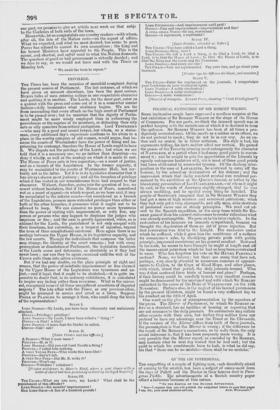POLITICAL EXTINCTION OF SIR ROBERT WILSON.
SOME inattentive people have expressed a needless surprise at the last exhibition of Sir ROBERT WILSON on the stage of the House of Commons. For our parts, we think the farewell speech was in perfect keeping with the melodrame of which it is destined to form the epilogue. Sir ROBERT WILSON has been at all times a pro- digiously overrated man. Of his merits as a soldier or an officer, we do not pretend to speak ; they do not lie in our way. As an an. thor and an orator, he is below criticism. His style is bad, his arguments trifling, his facts neither sifted nor certain. He gained the praise of the Tories by abusing most outrageously the character of NAPOLEON, at a period when it had many good points to recom- mend it ; and he sought to gain the approbation of the Liberals by equally outrageous laudation of it, when most of these good points had been obliterated by successful tyranny. Of the dashing inter- position in the case of LAVALETTE, he contrived to carry off the honour, by the schoolboy declamation of his defence ; and the impression which that lucky accident created was rendered per- manent by the exhibition at the Queen's funeral, or rather by the blundering persecution of Lord CASTLEREAGIT,—of whom it might be said, in the words of JOHNSON slightly changed, that he was always meddling, and he spoiled every thing he handled. The people of Southwark imagined that in Sir ROBERT WILSON they had got a man of high resolves and consistent patriotism; when they had only got a vain, changeable, and silly man, alike destitute of profound views and of steady principles. We need not ad- vert to the Spanish expedition, or the sorry fame which Sir RO- BERT gained from his earnest endeavours to render ridiculous what was already contemptible. We pass on to his later exploits. In the restoration of Isis honours we sincerely sympathized, because we thought the deprivation of them an act of gross injustice. But that restoration was fatal to the Knight. The exclusion under which he suffered, while it gave him the semblance of a sufferer
for conscience's sake, by identifying private pride with public principle, impressed consistency on his general conduct. Restored
to his rank, he seems to have thought he might at length cast off
the inconvenient patriotism which he had so long been constrained
to wear. Who has forgotten his vote on Sir HENRY PARNELL'S motion? None, we believe ; bat there are many that have not, perhaps, very closely attended to numerous rumours of appoint-
ments to Ceylon, to the Cape of Good Hope, and other places, with which, about that period, the daily journals teemed. Who was it that scattered these hints of honour and place ? Perhaps, if their history could be carefully traced, very excellent reasons
might be discovered for the mistimed zeal with which Sir ROBERT embarked in the cause of the Duke of WELLINGTON on the 15th November. Perhaps also, in the neglect of his fancied pretensions by the present Ministers, might be found a very sufficient key to his conduct on the 19th of April.
One word on the plea of misrepresentation by the reporters of the press. The Mirror of Parliament, to which Sir ROBERT re- fers as a standard, has no facilities of hearing or reporting that are not common to the daily journals. Its conductors may collate other reports with their own, but further they neither have nor pretend to have any advantage over the Times or the Chronicle. If the version of the Mirror differs from both of these journals, the presumption is that the Mirror is wrong; if the difference be the result of Sir ROBERT'S corrections, as he calls them, the only sound inference is, that it has been purposely made wrong. It is very possible that the Mirror report, as amended by Sir ROBERT, may contain what he next day wished that he had said ; but the point to which his constituents have to look, is what he did say. On that " there can be no mistake—there shall he no mistake."


























 Previous page
Previous page